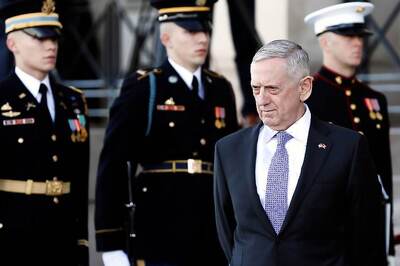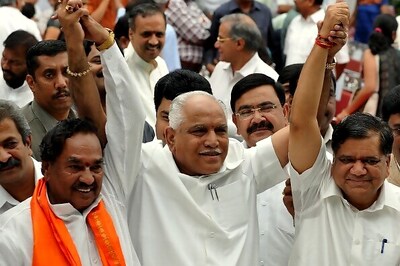
views
New Delhi: Anna Hazare, Baba Ramdev and the civil society are the new opposition parties as the Bharatiya Janata Party (BJP) and the Left Front have been relegated to the background in the anti-corruption crusade. Hazare and Ramdev have launched a major agitation against corruption and black money, and forced the United Progressive Alliance Government, which is already facing a lot of flak for not doing enough on the twin issues, on the backfoot.
These two unelected representatives of the civil society claim to have mass support and have ensured that the Government is now forced to draft a strong anti-corruption Lokpal Bill, something with the Opposition has failed to do.
While these anti-corruption agitations have been launched following the revelations of several scams in the country in the last few years, what is striking is that the fountainheads of these protests are those who have never been part of electoral politics, the cornerstone of our democracy.
The political system that is followed in India has the Government on one side and the Opposition on the other side. While the role, responsibilities and the duties of the government are well defined; the Opposition is tasked with ensuring that the government is always on its toes and does not use its majority to flout the mandate that was given to it by the electorate.
What we are witnessing today is that while corruption was always a big issue for a majority of Indians, the opposition parties including the BJP has failed to channelise public anger against the Central Government into a mass movement. This failure of the Opposition led to a vacuum which has been promptly filled up by Hazare, Ramdev and their supporters.
The BJP, the only party capable of launching a nation-wide agitation, has failed spectacularly in putting the Government on the mat over the corruption menace thereby ceding the ground to the civil society.
During the 2009 Lok Sabha elections the BJP was hopeful of coming back to power at the Centre as it believed that the Congress-led UPA, after the withdrawal of the Left Front's support, was not only vulnerable, but was also led by a 'weak' Prime Minister in Manmohan Singh as opposed to its 'iron-man' and prime minister-in-waiting Lal Krishna Advani.
However, the elections results came as a rude shock to the BJP as it ended up suffering a major setback and the Congress-led UPA lifted the winner’s trophy comfortably.
Since the 2009 election debacle, the BJP has failed to put up a united face with even the appointment of a new Leader of Opposition proving to be a Herculean task for the party. After much deliberation Advani stepped down and Sushma Swaraj was made the new Leader of Opposition in the Lok Sabha.
But this move was not enough to galvanise the party and it has failed to live up to its expected role of the principal opposition party in the Lok Sabha.
The UPA Government has lurched from one crisis to another since its massive and unexpected mandate in the 2009 Lok Sabha elections but with no opposition it has managed to stave off every challenge until Hazare decided to play spoilsport.
High inflation, massive scams and the silence of the Prime Minister on all the major issues gave the BJP the perfect excuse to launch a country-wide agitation. It was not only in the party's interest but also in the interest of country that the Government be forced to act and set its house in order.
While there were some attempts by the BJP to corner the UPA, there was no clear cut strategy on how to go ahead and project itself as the messiah of the people. The BJP's feeble attempts to take up the issues of corruption and rising prices of essential items failed to gather momentum because of a lack of leadership and cohesion with other smaller parties.
After the election of a little-known Nitin Gadkari as the party President, most of the top leaders including Sushma Swaraj, Arun Jaitley, Rajnath Singh and Venkaiah Naidu have been sticking to their personal agendas.
While these leaders, in their individual capacities, have tried to target the Government on a host of issues, yet they have failed to bury their differences and come out as one unit which could have forced the Government to act much before the civil society decided to launch its anti-corruption agitation.
To be fair the party did try to put the Government on the mat several times, but ended up indulging in only a slanging match with the treasury benches in Parliament.
The biggest example was Parliament's Winter Session when the BJP did not let the Lok Sabha function for even a single day demanding an investigation by the Joint Parliamentary Committee into the 2G spectrum scam. While raising an issue on the floor of the House is a legitimate tool, the BJP perhaps overdid it with its intransigence. The Government, too, refused to budge from its stand and the Opposition fell into the trap.
Even as day after day passed with no business being transacted in the Lok Sabha, the BJP failed to turn the public anger on the 2G scam , Commonwealth corruption cases and the emotive issue of Adarsh Housing Society flats which were meant for war heroes, but were usurped by politicians, bureaucrats and senior defence personnel, into a mass movement a la the Jayaprakash Narayan movement of the 1970s or the VP Singh-led agitation against corruption in the late 1980s – both of which saw the then government being routed in the following Lok Sabha election.
In the Hazare as well as the Ramdev-led agitation, the BJP has been reduced to a sidekick, whose only job is to address a press conference deriding the Congress and its allies or to take part in token protests when ideally it should be leading the fight for a corruption-free India.
But then some BJP leaders themselves are accused of indulging in corruption including the Karnataka government of BS Yeddyurappa. One of its presidents Bangaru Laxman was caught of camera accepting Rs 1 lakh as bribe. A similar sting saw another BJP leader Dilip Singh Judeo accepting money and calling it as being equal to God.
The BJP would like India to believe that may be by way of being in power at the Centre for a far shorter duration than the Congress, it is much cleaner and corruption free. Even with such a mindset the party has failed to exploit a situation when every thing was in its favour and the Government was clearly in discomfort.
Yet what we see is that the party is happy to have outsourced the anti-corruption movement to the civil society and apart than addressing the customary press conference on the issue or making a few guest appearances along side Ramdev, its leaders have failed to devise a long term strategy on the issue.
The Leader of Opposition in the Lok Sabha Sushma Swaraj was seeing along side Ramdev in Haridwar after the yoga guru was chased out of Delhi's Ramlila Maidan and other than a few words on how corruption was flourishing under the UPA regime, she did not have much to offer.
And herein lies the tragedy of India.
While a strong, efficient and corruption-free government is a must for the development of the country, the role of the Opposition in a parliamentary democracy cannot be underestimated. Even though the BJP could not have averted the numerous scams, but it could have forced the Government to act against the accused if it had been pro-active and had a clear strategy to take the issue of corruption to the masses.
With the party yet to come to terms with shocking 2009 election debacle and an ineffective leadership there is no way that the BJP will be able to reclaim its status as the principal opposition party of India unless it undergoes a drastic overhaul.
Meanwhile, India desperately waits for its principal opposition party to stand up and take this fight forward.



















Comments
0 comment